韩国诗人及独立斗士在舞台上展现一生
2025-01-31司马勤
美国表演艺术行业的顶流奖项被人们统称为EGOT,分别由四大奖项——艾美奖(Emmy,电视类)、格莱美奖(Grammy,录音类)、奥斯卡奖(Oscar,电影类)和托尼奖(Tony,舞台剧类)的首字母组合而成。这个“大满贯”榜单也许不是官方的,但的确是令人望尘莫及的。迄今为止,只有27人榜上有名。
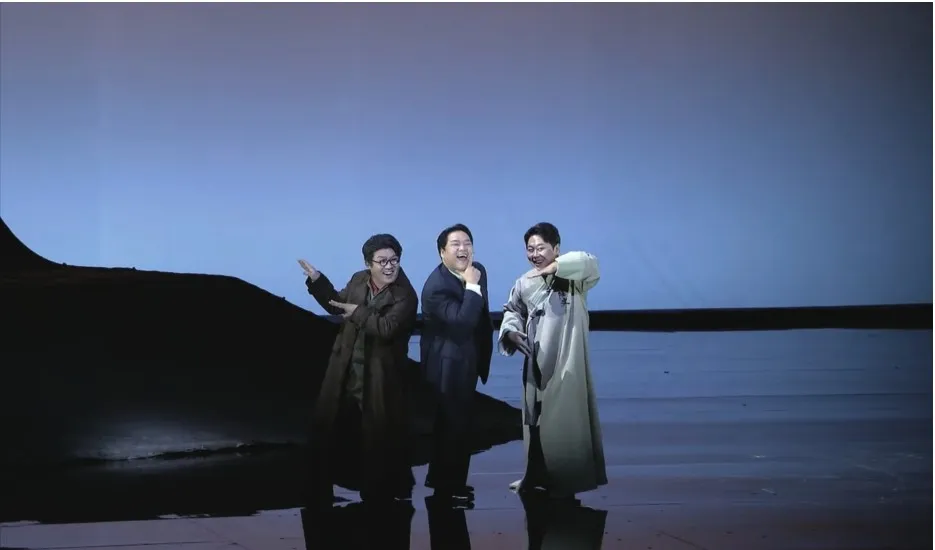
不过,从国家的层面来看,韩国是EGOT榜单上一个令人佩服的竞争者。电影《寄生虫》(Parasite,2020)获得了多项奥斯卡奖,剧集《鱿鱼游戏》(Squid Game,2022)获得了艾美奖、音乐剧《了不起的盖茨比》(The Great Gatsby,2022)获得了托尼奖。此外,韩国音乐家还拿下了相当多的格莱美奖,尤其是在古典音乐方面。然而,相较于该国在编剧和叙事方面的强劲实力,现代歌剧作品却明显缺席。尽管培养出许多优秀的歌唱家,并且在既定的剧目及曲目中赢得了一些格莱美奖项,但韩国的新歌剧在国际舞台上的发展却很缓慢。
直到现在,这样的情况才有所改变。由大邱歌剧院(Daegu Opera House)创制的作曲家金成宰(Kim Sungjae)的歌剧《264:一颗星》(264, That One Star)可能是打破这种不平衡的一个契机。目前,该剧在欧洲的“歌剧视野”(OperaVision)网站上串流(Streaming)播放,直至今年的6月13日。这是一部令人印象尤为深刻的歌剧,因为这个故事及其中心人物——韩国诗人和爱国运动家李源禄[ Yi Won-rok,他以笔名李陆史(Yi Yuk-sa)而闻名,这一笔名取自他的囚犯编号264的韩语发音] ——在韩国以外几乎不为人知。
然而,与任何经典作品一样,这个故事与各种文化背景息息相关。例如,李源禄(1904—1944)和英国诗人威尔弗雷德·欧文(1893—1918)之间存在一些相似之处:两人都是军人出身,都因有限的作品而声名鹊起(欧文只写了大约80首诗,李源禄的作品甚至仅有欧文的一半),两人都英年早逝(欧文25岁离世,李源禄是39岁)。但欧文的作品以关注战争的残酷而闻名——他的诗歌是本杰明·布里顿的反战作品《战争安魂曲》(War Requiem)的关键组成部分——李源禄的立场则不同,他支持武装冲突的必要性。通过他的作品,李源禄将日本对韩国人民的侵略暴行,包括他自己遭受的酷刑,转化为推翻日本殖民统治的民族情绪。

在他生命的不同阶段,李源禄是一位诗人、一位丈夫,也是韩国独立运动中一位令人敬畏的人物。和沃尔特·惠特曼一样,他涉猎的领域包罗万象——事实上,编剧金·哈纳(Kim Hana)在歌剧中为这个角色设计了几个“分身”,每个“分身”都有明确的个性和声音类型。也许不可避免的是,代表不同年龄和气质的歌者最终会在一个烘托气氛的合唱中走在一起。在这段合唱中,李源禄的不同“分身”会有重唱或轮唱(特伦斯·布兰查德在他的两部歌剧《冠军》和《骨子里的烈火》中都使用了这种技巧)。
从歌剧舞台上退一步说,你可以看到《264》借鉴了韩国电影和电视剧的剧本范式,编剧用创新的——甚至往往是超越传统的——内容填充进常规的故事框架。他们完全掌握了推动叙事的理念:如果故事中出现了足够多的令人熟悉的标志,观众们就会继续沿着这条路走下去。
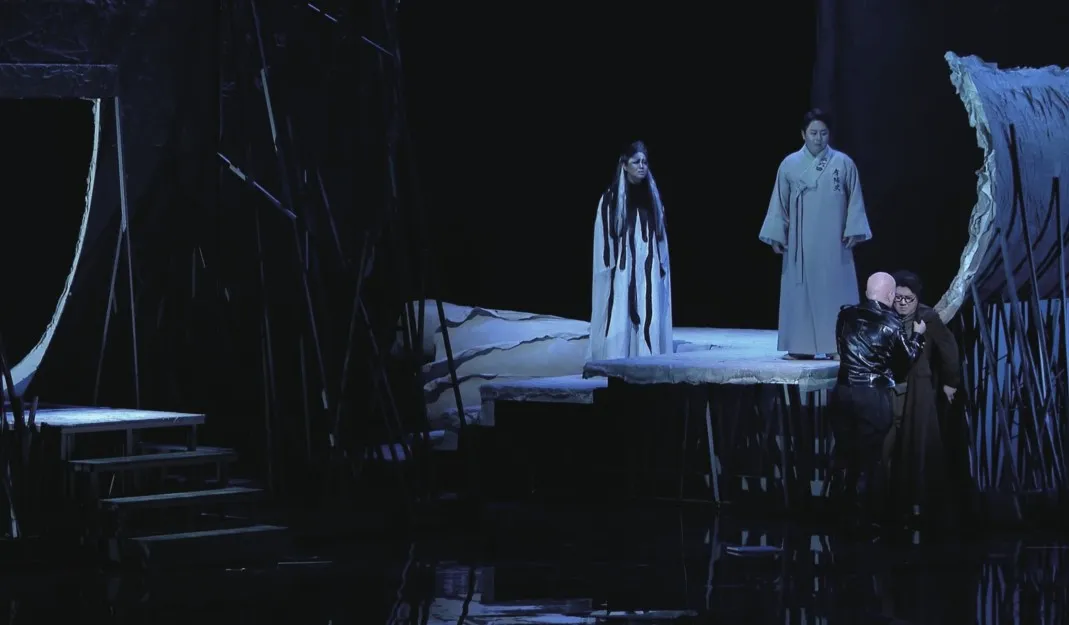
这一点在《264》中尤为重要,因为叙述往往会转向抽象的方向。导演裴贤镇(Pyo Hyunjin)很好地处理了分支剧情的焦点,且没有忽略应有的主线。叙述故事的效果也证明了这类手法的合理性。
大多数艺术家(尤其是作家)的传记作品中最常见的失败之处在于,很难在舞台或银幕上展示他们的艺术天赋,或所有细枝末节的情节。《波希米亚人》(La bohème)故事中的鲁道夫是一位诗人,但我们几乎不得不相信普契尼对他的评价(如果鲁道夫不是一位特别优秀的诗人,这可能会让他更有亲和力)。相比之下,保罗·施拉德(Paul Schrader)的《三岛由纪夫:人间四幕》(Mishima: A Life in Four Chapters)实际上是从三岛自己的戏剧作品中的拍摄程式化的场景而来,并为丰富他的文学资历迈出了额外的一步。同样,在《264》中,李源禄的诗歌作品似乎被直接引用并镶嵌在歌词中,以证实他的文学和革命资历(我只能坚信这一点,因为我无法在英文字幕中分辨出他在韩国文学中的文采)。
音乐也遵循着一条类似的路径。正如许多观察家喜欢宣称的那样,西方歌剧传统随着《图兰朵》而落幕,但编剧金·哈纳估计没有接触过这份备忘录。事实上,在《264》中普契尼始终是一个显而易见的参照物,不仅有《图兰朵》和《蝴蝶夫人》中重新被设计过的“亚洲”音色,而且《264》中的酷刑场景也与《托斯卡》中的某些桥段相呼应。在轻松的时刻——金·哈纳清楚地意识到,先扬后抑的节奏会让戏剧性冲突变得更加强烈——这似乎是从莱哈尔的轻歌剧中得到的启示。
考虑到韩国歌手们的声乐实力,这一策略表现得特别好。像世界上大多数歌剧演员一样,他们接受过多种欧洲语言的严格训练;在《264》中,他们终于有机会用自己的母语演唱了。这使得演员们能够更好地连接音乐线条,并使情感上的戏剧性传递更为流畅。
在剧中饰演士兵李源禄的男高音罗盛洪(Rho Seonghoon,音译)和饰演丈夫李源禄的李忠民(Lee Chungman,音译),是同一角色的不同方面,与饰演诗人李源禄的男中音金尚哲(Je Sangchul,音译)的音色与造型形成鲜明的对比。对于已经了解历史细节的韩国人来说,事先仔细阅读故事梗概可能更为合适。女高音李胤卿(Yi Yunkyoung)饰演李源禄的妻子安一阳(An Il-yang),从最初的轻松愉快转变为对丈夫命运的担心。女中音金宝拉(Kim Bora)饰演李源禄的灵魂知音,在完全不同的层面上提供了戏剧性的联系,并激发了道德反思的时刻。男中音李昇玟(Lee Seungmin)在饰演李源禄的哥哥后,以令人难忘的斯卡皮亚式暴行回归,出演了对李源禄实施酷刑的日本人江军官(Sergeant Go)。
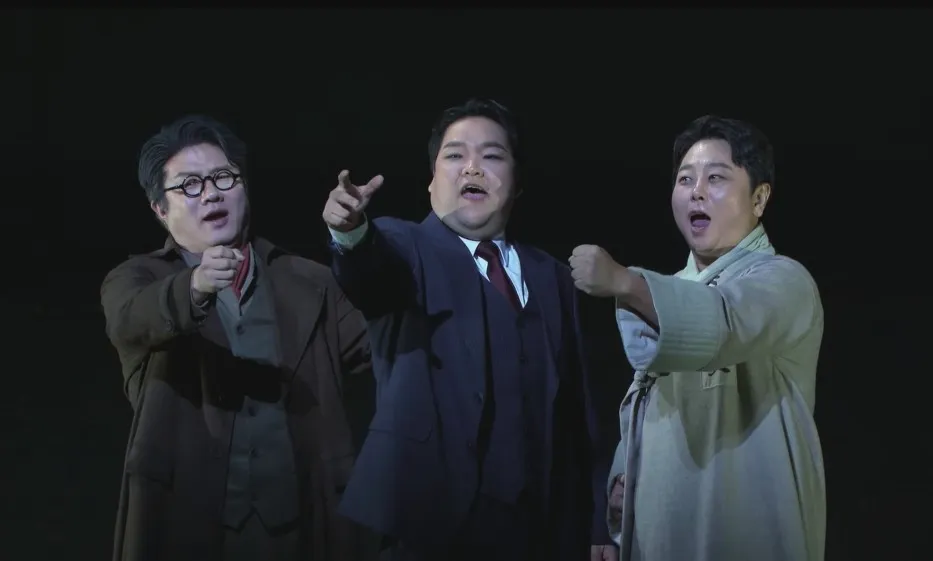
对于习惯了西方歌剧在过去一百年(实际上正是这个故事中描述的那些年)发展方向的听众来说,《264》是一次相当大的倒退。指挥家李东信(Lee Dongsin)不仅带领主演,还以自信的风格优雅地领导着管弦乐队和合唱团。轻松的时刻与戏剧性的场景达到了稳定的平衡(可实话实说,大邱歌剧合唱团的成员应该让《264》的婚礼更加热闹生动)。但最终,对于那些发现过去一个世纪的歌剧在音乐上令人不快,并且仍然在寻找挑战心灵而不伤害耳朵的抒情故事的人来说,《264》可能是适合你的剧目。
America has an elite club in the performing arts called the EGOT, an acronym for people who’ve won the top industry awards in television (the Emmy), audio recording (the Grammy), film (the Oscar) and Broadway theatre (the Tony). It may not be official, but membership is quite exclusive. To date, only 27 individuals have made the list.
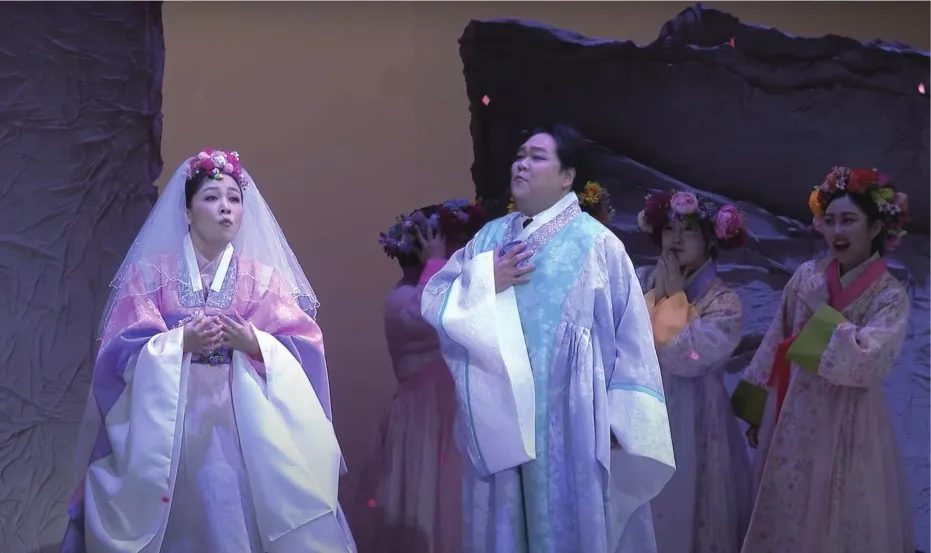
As a national entity, though, South Korea is an impressive contender, having won several Oscars for Parasite (2020), Emmys for Squid Game (2022), Tonys for The Great Gatsby (2022) and quite a few Grammys, particularly in classical music. Conspicuously absent, though, given the country’s prowess in spinning powerful narratives, is new opera. Despite producing a number of fine vocalists who’ve garnered a handful of Grammys in established repertoire, new Korean stories have been slow to reach the international stage.
Until now. The opera 264, That One Star by composer Kim Sungjae, created and produced by the Daegu Opera House, may be a way of correcting that imbalance. The fact that the show is currently streaming on Europe’s OperaVision through 13 June is particularly impressive, given that both the story and its central character—the poet and independence advocate Yi Won-rok (better known under his pen name “Yi Yuksa”, the Korean pronunciation of his prisoner number, 264)—are all but unknown outside Korea.
As with any classic, though, the story is immediately relatable to many cultures. For example, a few parallels exist between Yi (1904–1944) and the English poet Wilfred Owen (1893–1918): both were soldiers, both burnished literary reputations from a limited output(Owen wrote only about 80 poems, Yi only half that) and both suffered premature deaths (Owen at 25, Yi at 39). But where Owen’s work famously focused on the horrors of war—his poems are a key component of Benjamin Britten’s anti-war War Requiem—Yi championed the occasional necessity of armed conflict. Through his work, Yi was able to turn the story of Japanese atrocities against the Korean people, including his own torture, into a national sentiment to overthrow Japanese colonial rule.
Yi was (at various points of his life) a poet, a hus- band, and a formidable figure in Korea’s resistance movement. Like Walt Whitman, he was large and contained multitudes—so much, in fact, that librettist Kim Hana divides the character into several roles, each with a clearly defined personality and voice type. And perhaps inevitably, the singers representing those different ages and temperaments finally join together in a climactic ensemble, where the different sides of Yi’s persona sing among themselves. (Terence Blanchard, for one, utilizes this technique in both of his operas, Champion and Fire Shut Up in My Bones.)
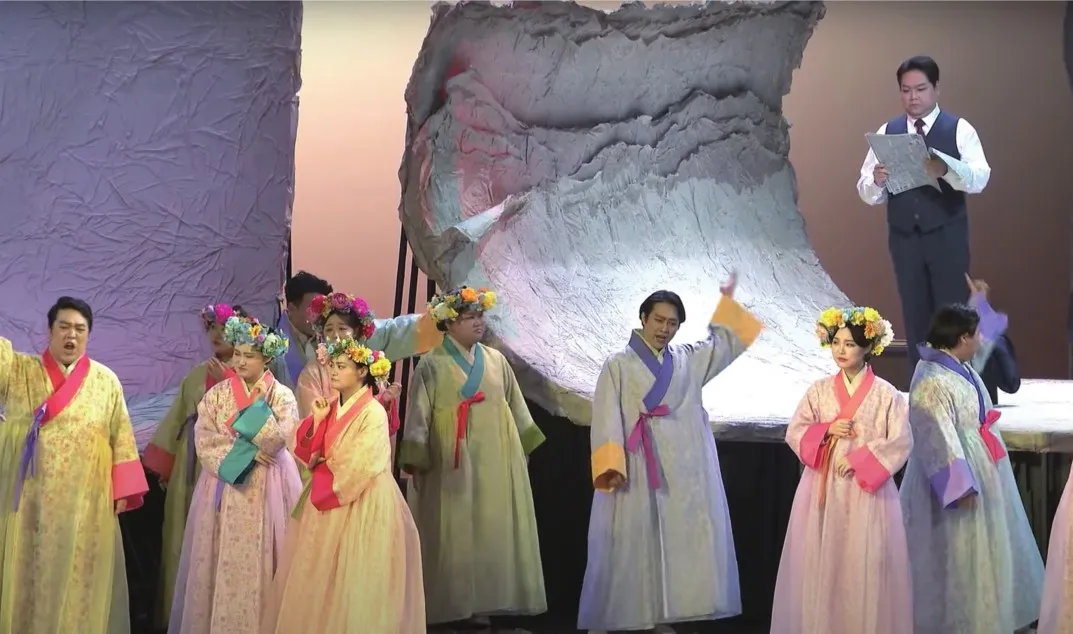
Stepping back a bit from the opera stage, you can see the ways that 264 borrows from the same playbook as Korean film and television dramas, where storytelling fills largely conventional forms with inventive—often transgressive—content. They fully grasp the idea of driving a narrative: If the story has enough familiar signage, audiences will keep following the road, no matter how dark or imposing.
That’s particularly important in 264, where the narrative often veers into abstract directions. Director Pyo Hyunjin does a fine job of keeping those byways in focus, not losing sight of the story’s highway. So too does the storytelling work to justify the effort.
The most common failure of most biographical accounts of artists—writers in particular—is that it’s hard to show on stage or screen what all the fuss is about. Rodolfo in La bohème is supposed to be a writer, but we pretty much have to take Puccini’s word for it.(If he’s not a particularly good writer, that probably makes him even more relatable.) By contrast, Paul Schrader’s Mishima: A Life in Four Chapters actually films stylized scenes from Mishima’s own dramatic works, taking that extra step in establishing his literary credentials. Similarly In 264, direct quotes from Yi’s work seemingly waft through the libretto, as if to confirm both his literary and revolutionary reputation (I’m taking this on faith, since the English subtitles often miss the literary mark).
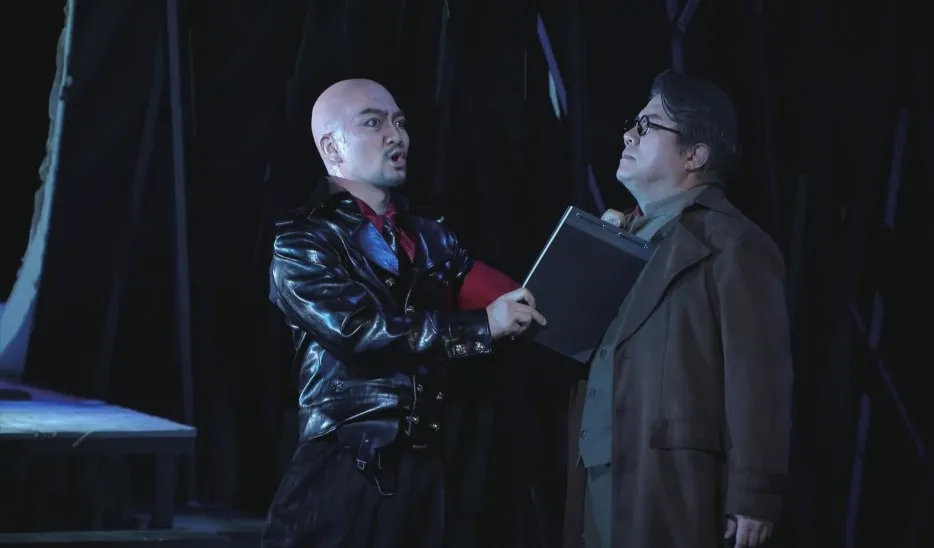
The music follows a similar familiar path. If the Western operatic tradition ended with Turandot, as so many observers are fond of declaring, Kim didn’t get the memo. Puccini, in fact, remains a palpable model throughout, not just with repurposed “Asian” sonorities from Turandot and Madama Butterfly but also echoes of Tosca in the opera’s torture scenes. Lighter moments—and Kim clearly grasps that dramatic moments become much stronger when lightened beforehand—seem to take a cue from Léhar operettas.
Given the musical strengths of the cast, that gambit plays particularly well. Like most opera singers around the world, they are heavily trained in numerous European languages; here, they finally get a chance to sing in their own. The result leads to palpable connection to the musical line and conviction in dramatic delivery.
Playing different facets of the same character, tenors Rho Seonghoon (Soldier 264) and Lee Chungman(Husband 264) stood both in physical and vocal contrast against baritone Je Sangchul (Poet 264)—though, perhaps especially for Koreans who already know the historical details, a close reading of the synopsis beforehand would be in order. Soprano Yi Yunkyoung as Yi’s wife An Il-yang moves from an initial lighthearted bloom into emotional resolve over her husband’s fate. Mezzo-soprano Kim Bora as Yi’s Soulmate offers dramatic connection on a different level entirely, inspiring moments of moral reflection. Baritone Lee Seungmin, after a disposable turn as 264’s brother, returns with memorably Scarpia-like brutality as Japanese torturer Sergeant Go.
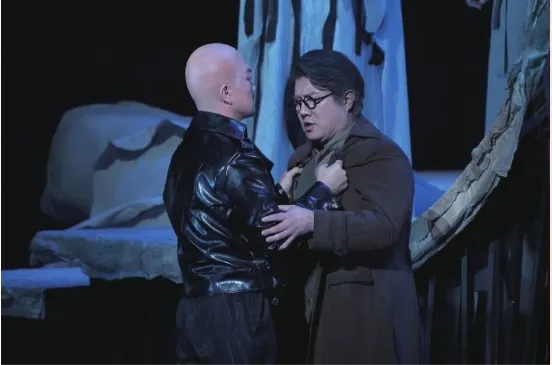
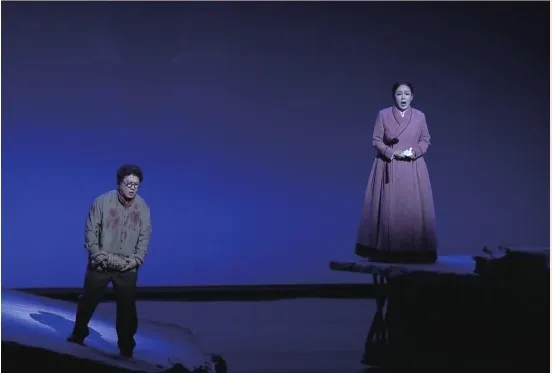
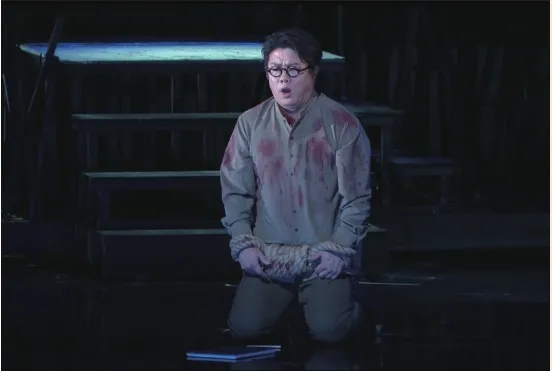
For listeners used to the direction Western opera has taken over the past hundred years (essentially the years portrayed in this story), 264 is quite a throwback. Conductor Lee Dongsin leads not just the principal cast but also the orchestral and choral forces with assured stylistic grace. Lighthearted moments find a smooth balance with scenes of dramatic intensity (though truth be told, members of the Daegu Opera Choir might have rendered 264’s wedding with a bit more exuberance). But ultimately, for anyone who finds the past century of operas musically off-putting and is still in search of lyrical stories that challenge the mind without tasking the ear, 264 may be the show for you.
